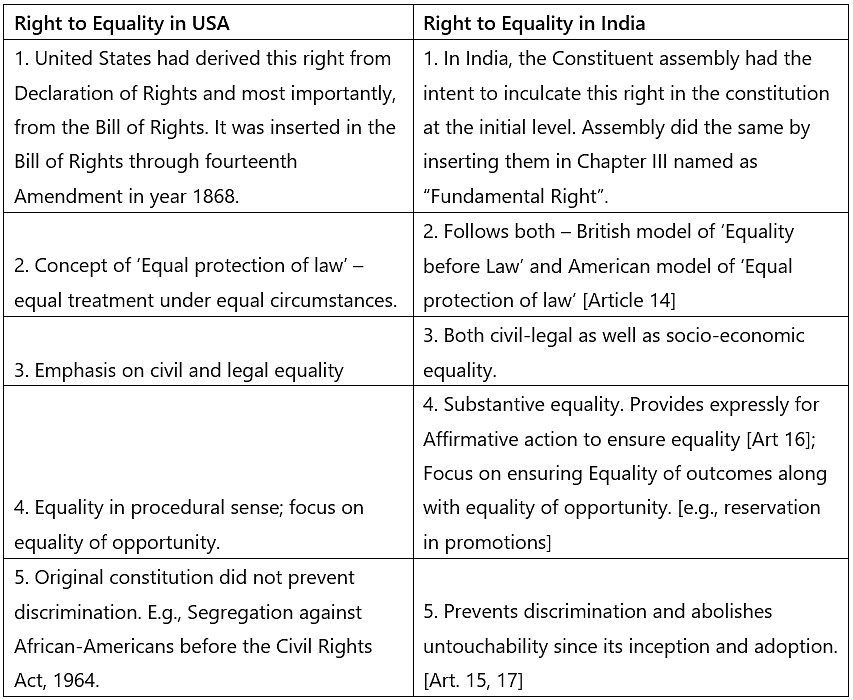UPSC Exam > UPSC Notes > Indian Polity for UPSC CSE > GS2 PYQ (Mains Answer Writing): Equality in Indian Constitution
GS2 PYQ (Mains Answer Writing): Equality in Indian Constitution | Indian Polity for UPSC CSE PDF Download
Analyze the distinguishing features of the notion of Equality in the Constitutions of the USA and India. (UPSC GS2 Mains)
While both India and the USA are culturally pluralistic societies which have a democratic form of government and similar judicial systems, they have different interpretation of the notion of Right to Equality.
Topics covered - Equality in Constitution and Fundamental Rights
The document GS2 PYQ (Mains Answer Writing): Equality in Indian Constitution | Indian Polity for UPSC CSE is a part of the UPSC Course Indian Polity for UPSC CSE.
All you need of UPSC at this link: UPSC
|
145 videos|602 docs|203 tests
|
FAQs on GS2 PYQ (Mains Answer Writing): Equality in Indian Constitution - Indian Polity for UPSC CSE
| 1. What is the concept of equality in the Indian Constitution? |  |
Ans. The concept of equality in the Indian Constitution is enshrined in Article 14, which guarantees equality before the law and equal protection of the laws to all individuals. It ensures that no person is discriminated against on grounds of religion, race, caste, sex, or place of birth. This principle of equality is a fundamental right and forms the cornerstone of our democratic society.
| 2. How does the Indian Constitution promote equality? |  |
Ans. The Indian Constitution promotes equality through various provisions. Apart from Article 14, there are specific provisions like Article 15, which prohibits discrimination on grounds of religion, race, caste, sex, or place of birth. Article 16 ensures equal opportunities in public employment. Article 17 abolishes untouchability, and Article 39 promotes social and economic equality. These provisions collectively aim to establish a just and egalitarian society.
| 3. What are the limitations to the concept of equality in the Indian Constitution? |  |
Ans. While the Indian Constitution guarantees equality, there are certain limitations to this concept. The Constitution itself provides for certain exceptions and affirmative actions to address historical injustices. For example, reservation policies are implemented to uplift marginalized sections of society. Additionally, personal laws based on religion or custom may sometimes create distinctions among individuals. However, these limitations are aimed at achieving substantive equality and ensuring social justice.
| 4. How is the concept of equality interpreted by the Indian judiciary? |  |
Ans. The Indian judiciary plays a pivotal role in interpreting the concept of equality. It has adopted a dynamic and progressive approach and has expanded the scope of equality to include various aspects. The judiciary has recognized that equality is not merely about treating everyone the same but also about addressing historical inequalities and empowering marginalized sections. It has upheld affirmative actions, such as reservations, as necessary to achieve substantive equality.
| 5. How does the concept of equality contribute to the overall development of India? |  |
Ans. The concept of equality is crucial for the overall development of India. By ensuring equal opportunities and protection for all individuals, it promotes social harmony and inclusivity. It helps in eradicating discrimination and fostering a sense of unity and belonging. Equality also promotes economic growth by providing a level playing field for all individuals to participate in the nation's progress. It is a fundamental value that strengthens the democratic fabric of our country.

|
Explore Courses for UPSC exam
|

|
Signup for Free!
Signup to see your scores go up within 7 days! Learn & Practice with 1000+ FREE Notes, Videos & Tests.
Related Searches

















